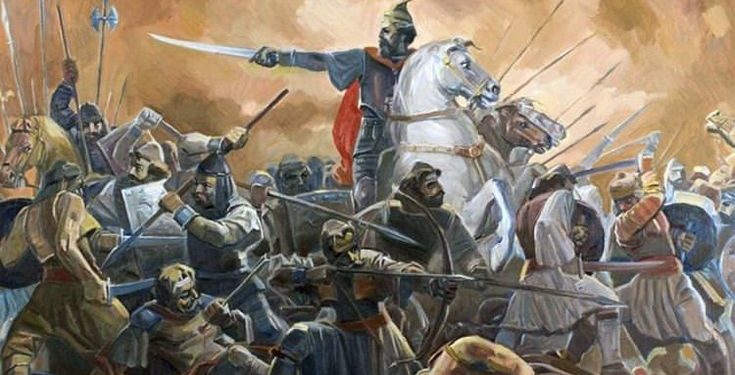The Crusades are often presented as a righteous attempt to reclaim lost lands, yet they represent one of the darkest and most embarrassing periods in Christian history. Far from an act of divine will, the Crusades were a violent, power-driven conquest cloaked under the banner of Christianity. The true intentions behind these wars were not piety, but greed, land-grabbing, and a brutal quest for control. The very idea that these campaigns were religiously justified is a disgrace, not just to Christianity, but to humanity as a whole.
First, it is important to acknowledge the brutal reality of the Crusades, rather than romanticizing or whitewashing them as some sort of noble effort. Many of those who participated in these bloody campaigns were not true Christians by any standard. Instead, they were power-hungry men who cynically used religion to justify their violent actions. The brutality and cruelty that were unleashed upon entire populations during these Crusades cannot be erased by the simple claim that they were “Christian.” These were actions fueled by political and territorial ambition, not a desire to spread peace or salvation.
The notion that the Crusades were simply a response to the Muslim conquests of Christian lands is a gross oversimplification. Yes, the lands that the Crusaders sought to reclaim had once been home to large Christian populations. However, by the time the Crusaders arrived, these areas had long since been under Muslim control. The Crusaders were not fighting to protect a Christian legacy that had been unjustly taken from them. Instead, they were attempting to reassert their dominance and claim lands that had long been integrated into a different religious and political context. The Crusaders were not merely defenders of their faith—they were aggressors, seeking to expand their power at the expense of others.
The consequences of the Crusades were not just confined to the battlefields. The violent campaigns carried out in the name of Christianity left a legacy of hatred, division, and deep resentment. The forced conversions, the slaughter of civilians, and the destruction of entire communities were acts that defiled the Christian faith and sowed the seeds of future conflict. Even today, the Crusades continue to shape the perception of Christianity in many parts of the world, particularly in the Muslim world, where the memory of the Crusaders’ violence is still vivid. For many Muslims, the Crusades are not just a distant historical event; they are a reminder of the bloodshed and oppression that Christianity brought to their ancestors.
The impact of the Crusades is not limited to historical memory; it continues to affect modern-day relations between Christians and Muslims. Some Islamic extremists point to the Crusades as a justification for their violent actions today. In their minds, the terror attacks they carry out are not merely random acts of violence, but a form of repayment for the atrocities committed by the Crusaders centuries ago. For them, the violence of the Crusades is a stain on the Christian faith that has yet to be cleansed, and their acts of terrorism are a twisted form of retribution.
While it is easy to dismiss this line of thinking as irrational, it is crucial to understand that the memory of the Crusades is still very much alive for many Muslims. The sense of injustice and humiliation that they feel as a result of the Crusaders’ actions is not something that can be easily forgotten or ignored. The violence of the Crusades has created a deep divide, one that has been passed down through generations, and it is understandable that some Muslims view modern-day Christian actions through the lens of this painful history. This does not justify terrorism, but it does shed light on the long-lasting consequences of religiously motivated violence.
To claim that the Crusades were a “just war” or a noble cause is an insult to the countless innocent lives that were lost in these campaigns. The Crusaders’ actions were not guided by any moral or ethical standard; they were driven by a desire for conquest and domination. The forced conversions and mass killings carried out in the name of Christianity are some of the darkest moments in the history of the religion. The Crusades were not a battle for faith; they were a battle for power and land, using religion as a convenient tool for justification.
In attempting to defend Christianity from accusations related to the Crusades, one must ask: Why should the actions of individuals hundreds of years ago still be held against modern Christians? Is it fair to judge an entire faith by the violent actions of a few? And yet, this is exactly what happens when critics of Christianity point to the Crusades as evidence of the religion’s inherent violence and intolerance. The truth is that no religion, including Christianity, is immune from criticism when it comes to the violence that has been carried out in its name.
The legacy of the Crusades serves as a stark reminder of the dangers of using religion to justify violence and conquest. The violence committed during the Crusades was not a reflection of the true teachings of Christianity, but rather a perversion of them. The Crusades were an abuse of power, and their impact is still felt today. In order to move forward, it is essential that Christianity acknowledges the mistakes of its past and works to heal the wounds that were inflicted by the Crusaders’ actions. Only then can true reconciliation take place, and the stain of the Crusades be washed away.







Discussion about this post